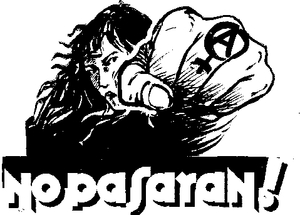Still working to recover. Please don't edit quite yet.
Difference between revisions of "Anarcha-feminism"
m (anarcha-feminism moved to Anarcha-feminism over redirect) |
Netsurfer123 (Talk | contribs) |
||
| (20 intermediate revisions by 11 users not shown) | |||
| Line 3: | Line 3: | ||
[[Image:Nopasaran.jpg|thumb|left|Anarchafeminist illustration]] | [[Image:Nopasaran.jpg|thumb|left|Anarchafeminist illustration]] | ||
| − | {{ | + | {{Echo of Freedom|93918|Feminism and Gender liberation}} |
| + | {{The Anarchist Library|feminist}} | ||
| − | + | Radical feminism espouses belief that [[patriarchy]] is a fundamental problem in our society. Feminist anarchism, or '''anarcha-feminism''' a term created during [[second-wave feminism]], views [[patriarchy]] as the first manifestation of hierarchy in human history; thus, the first form of oppression occurred in the dominance of male over female. | |
| − | Anarcha-feminism is most often associated with early 20th-century authors and theorists such as [[Emma Goldman]] and [[Voltairine de Cleyre]], although even early first-wave feminist | + | Anarcha-feminism is most often associated with early 20th-century authors and theorists such as [[Emma Goldman]] and [[Voltairine de Cleyre]], although even early first-wave feminist Mary Wollstonecraft held proto-anarchist views. In the [[Spanish Civil War]], an anarcha-feminist group, [[Mujeres Libres|"Free Women"]], organized to defend both anarchist and feminist ideas. |
| − | + | Wendy McElroy is an example of a contemporary anarcho-capitalist feminist. An example of an anarcha-feminist is [[Emma Goldman]]. | |
== See also == | == See also == | ||
| Line 22: | Line 23: | ||
{{wikipedia|Anarcha-feminism}} | {{wikipedia|Anarcha-feminism}} | ||
| − | |||
[[Category:Anarcha-feminism]] | [[Category:Anarcha-feminism]] | ||
[[de:Anarcha-Feminismus]] | [[de:Anarcha-Feminismus]] | ||
| − | [[fr: | + | [[el:ΑναÏχοφεμινισμός]] |
| + | [[eo:Anarki-feminismo]] | ||
| + | [[es:Anarcofeminismo]] | ||
| + | [[fr:Anarcho-féminisme]] | ||
| + | [[he:×× ×¨×›×•-×¤×ž×™× ×™×–×]] | ||
| + | [[hr:anarho-feminizam]] | ||
| + | [[id:Anarka-Feminisme]] | ||
| + | [[it:anarco-femminismo]] | ||
| + | [[lv:anarho-feminisms]] | ||
| + | [[ro:Anarha-feminism]] | ||
[[sr:anarho-feminizam]] | [[sr:anarho-feminizam]] | ||
| + | [[sv:Anarkafeminism]] | ||
| + | [[tr:Anarka-feminizm]] | ||
| + | [[zh:無政府女性主義]] | ||
| + | [[fa:آنارکوÙمینیسم]] | ||
Latest revision as of 16:55, 19 November 2012
| |
Echo of Freedom, Radical Podcast has a podcast related to this aticle Feminism and Gender liberation |
EoF |
| |
The Anarchist Library has texts related to this article Anarcha-feminism |
T@L |
Radical feminism espouses belief that patriarchy is a fundamental problem in our society. Feminist anarchism, or anarcha-feminism a term created during second-wave feminism, views patriarchy as the first manifestation of hierarchy in human history; thus, the first form of oppression occurred in the dominance of male over female.
Anarcha-feminism is most often associated with early 20th-century authors and theorists such as Emma Goldman and Voltairine de Cleyre, although even early first-wave feminist Mary Wollstonecraft held proto-anarchist views. In the Spanish Civil War, an anarcha-feminist group, "Free Women", organized to defend both anarchist and feminist ideas.
Wendy McElroy is an example of a contemporary anarcho-capitalist feminist. An example of an anarcha-feminist is Emma Goldman.
See also[edit]
Credits[edit]
Original text is compilation of three texts:
- Definition from Wikipedia and
- An Anarchist FAQ.
- The most part of the text is written by Flick Ruby. Original text can be found at Spunk.
| This article contains content from Wikipedia. Current versions of the GNU FDL article Anarcha-feminism on WP may contain information useful to the improvement of this article | WP |
